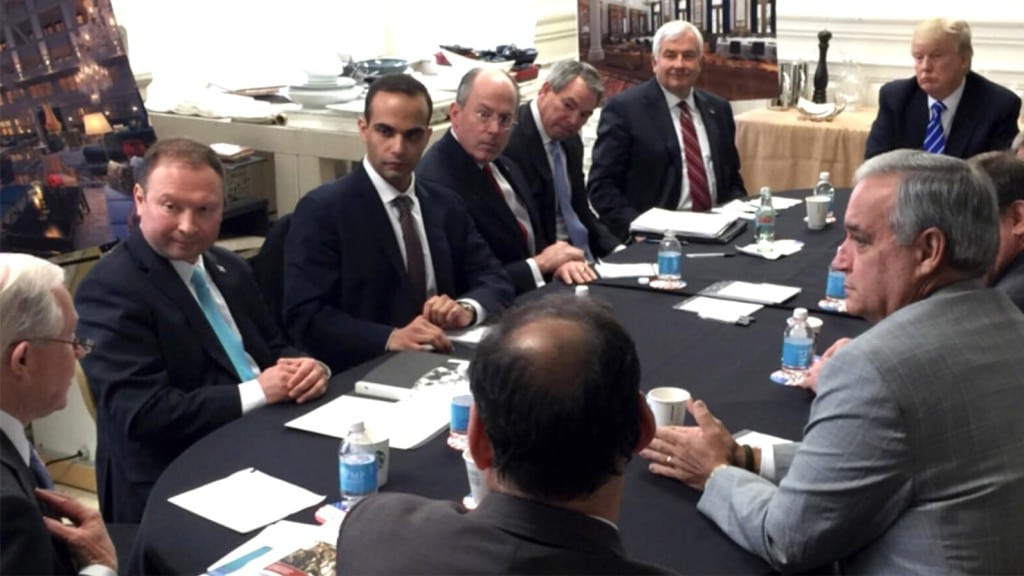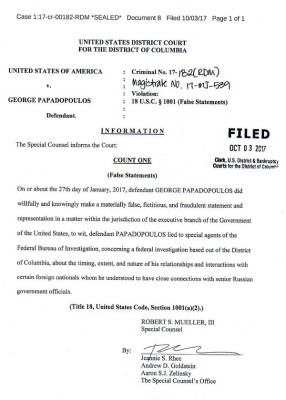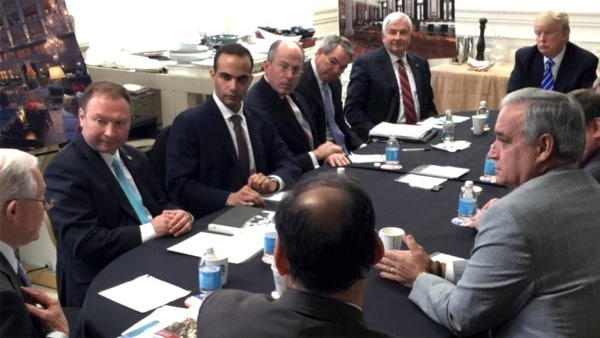On Monday, Special Counsel Robert Mueller and the FBI revealed the guilty plea of former Trump campaign advisor George Papadopoulos to lying to the Trump-Russia investigation.
Information around Papadopoulos’ conviction, including the court records of his offense, contains some of the most significant evidence of possible Trump-Russia collusion to date.
It is a tangled story involving multiple people in the Trump campaign, the UK, and Russia. However, set out on a timeline, it verifies that the Trump campaign — at the least — was open to a meeting with high-level Russian officials, and that there was discussion of collaboration over the release of material damaging Democratic nominee Hillary Clinton.
Early March 2016: George Papadopoulos becomes a Trump foreign policy advisor. He is brought in by senior Trump staffer Sam Clovis, who has been tasked with forming a foreign policy advisory team amid media questions whether Trump has any significant expertise on his campaign.
Living in London, Papadopoulos is a relatively unknown consultant over oil and gas affairs. He graduated from university in 2009, moved to London to get a master’s degree in security studies, worked from 2011 to 2014 as an unpaid intern for the Hudson Institute in Washington, and briefly served as a foreign policy advisor to GOP Presidential primary candidate Ben Carson.
Carson’s campaign manager Barry Bennett says he was not consulted about the appointment and would not have recommended Papadopoulos because he found him unimpressive.
About March 14, 2016: In Italy, Papadopoulos meets academic Joseph Mifsud.
Mifsud, a Maltese national, is an honorary director for the London Academy of Diplomacy. He has claimed that he has Russian contacts to the highest levels and that he had a private meeting with President Vladimir Putin.
Mifsud takes little interest in Papadopoulos until he learns the consultant has joined the Trump campaign.
March 16, 2016: WikiLeaks launches a searchable archive of e-mails sent to and from Hillary Clinton’s private server when she was Secretary of State, obtained through the Freedom Information Act
March 19, 2016: Russians hack John Podesta, Hillary Clinton’s campaign chairman. Another Russian group had breached the Democratic National Committee in mid-2015, although the hack does not become public until June 2016.
March 21, 2016: Donald Trump tells The Washington Post that Papadopoulos is one of five foreign policy advisors: “he’s an energy and oil consultant, excellent guy”.
About March 24, 2016: At a meeting with Mifsud in London, Papadopoulos is introduced to a Russian woman, “Putin’s niece”, whom he believes has connections to Russian government officials. He also anticipates a meeting with the Russian Ambassador to the UK.
Papadopoulos later finds that the woman is not related to Putin. The meeting with the ambassador does not take place.
March 28, 2016: Trump brings in Paul Manafort as a senior campaign advisor.
Between March 24 and March 31, 2016: Papadopoulos e-mails several members of the Trump campaign telling them that he had met Mifsud, the Russian woman, and — falsely — the Russian ambassador to London. He says they discussed arranging a meeting between the Trump campaign and the Russian leadership to “discuss US-Russia ties under President Trump”.
Sam Clovis tells Papadopoulos: “Great work”.
March 31, 2016: Papadopoulos attends a meeting of Donald Trump’s national security team, chaired by now-Attorney General Jeff Sessions and attended by Trump.
Papadopoulos says he has connections that could help arrange a meeting between Trump and Putin. Trump doesn’t “say yes and he didn’t say no”, according to a staffer in the room.
Two officials say Sessions shut down conversation on the topic at the time.
Trump posts a picture of the meeting to Instagram.

Early April 2016: Papadopoulos works with Russian contacts to arrange a meeting between the Trump campaign and the Russian government, sending “multiple emails” to the campaign.
The Russian woman writes at one point: “We are all very excited by the possibility of a good relationship with Mr Trump”. Mifsud says he is going to Moscow for a meeting of the Valdai Discussion Club thinktank on April 19.
April 18, 2016: Mifsud introduces Papadopoulos by e-mail to Ivan Timofeev, a program director the Russian government-funded Russian International Affairs Council, who has connections to the Russian Foreign Ministry. The two have “multiple conversations” over the next few weeks about a meeting between the campaign and Russian officials.
April 25, 2016: Papadopoulos tells a “senior campaign figure” that he has secured “an open invitation by Putin for Mr Trump to meet him when he is ready”.
About April 26, 2016: Mifsud, who has returned from Moscow, tells Papadopoulos that he met senior Russian officials and learned that they have obtained “dirt” on Clinton and “thousands of emails” connected to her.
April 27, 2016: Donald Trump gives a speech at the Mayflower Hotel in Washington calling for “eased tension and improved relations with Russia”. Russia Ambassador Sergei Kislyak attends and meets Trump campaign officials, including Jeff Sessions and Trump’s son-in-law Jared Kushner.
Papadopoulos e-mails “senior policy advisor”: “Have some interesting messages coming in from Moscow about a trip when the time is right”. He e-mails campaign manager Corey Lewandowski: “Have been receiving a lot of calls over the last month about Putin wanting to host him [Trump] and the team when the time is right.”
About May 4, 2016: Timofeev e-mails Papadopoulos and Mifsud, “I have just talked to my colleagues from the MFA [Ministry of Foreign Affairs]. The[y] are open for cooperation. One of the options is to make a meeting for you at the North America Desk, if you are in Moscow.”
Papadopoulos forwards e-mail to Lewandowski, “What do you think? Is this something we want to move forward with?”
May 5, 2016: Papadopoulos calls Clovis and forwards May 4 e-mail to him.
May 14, 2016: After another encouraging Timofeev e-mail, Papadopoulos e-mails Lewandowski, “Russian government ha[s] also relayed to me that they are interested in hosting Mr. Trump.”
May 2016: Papadopoulos tells the Telegraph of London that UK Prime Minister David Cameron should apologize to Donald Trump for calling the candidate “divisive, stupid and wrong”, amid controversy over Trump’s proposed “Muslim Ban”.
Displeased campaign officials tell Papadopoulos to clear future media appearances with them and keep a low profile.
May 21, 2016: Papadopoulos e-mails senior campaign official Paul Manafort, “Russia has been eager to meet Mr. Trump for quite sometime and have been reaching out to me to discuss.”
Manafort tells a colleague to pull back on Papadopoulos’ initiative: “We need someone to communicate that DT [Trump] is not doing these trips. It should be someone low level in the campaign so as not to send any signal.”
June 1, 2016: Trump campaign manager Corey Lewandowski refers Papadopoulos to Clovis, whom he said was now “running point” on the possible contacts.
Papadopoulos e-mails Clovis, “I have the Russian MFA asking me if Mr. Trump is interested in visiting Russia.”
June 9, 2016: Donald Trump Jr., Trump’s son-in-law Jared Kushner, and Manafort meet three Kremlin-linked envoys in a discussion including a Russian offer of damaging information about Clinton.
Donald Trump Sr. tweets for the first time about Clinton’s e-mails:
How long did it take your staff of 823 people to think that up–and where are your 33,000 emails that you deleted? https://t.co/gECLNtQizQ
— Donald J. Trump (@realDonaldTrump) June 9, 2016
June 19, 2016: Papadopoulos e-mails Lewandowski, “The Russian Ministry of Foreign Affairs messaged and said that if Mr. Trump is unable to make it to Russia, if a campaign rep (me or someone else) can make it for meetings? I am willing to make the trip off the record if it’s in the interest of Mr. Trump and the campaign to meet specific people.”
Late June or early July 2016: With other Trump national seucrity advisors, Papadopoulos attends a dinner at the Capitol Hill Club. He is seated to the left of Jeff Sessions.
Carter Page tells attendees at the club, including Sessions, that he is going to Moscow in three days.
July 2016: Carter Page, an oil and gas consultant also named by Trump in March as one of his five foreign policy advisors, visits Moscow.
The Trump-Russia dossier, compiled by former British intelligence officer Christopher Steele, claims Page met Igor Sechin, a US-sanctioned associate of President Vladimir Putin and president of the oil company Rosneft, and Kremlin official Igor Divyekin. The discussion is about Russia’s provision of anti-Clinton material.
Sechin allegedly offers Page and Trump associates a 19% brokerage stage in the privatization of Rosneft as part of an effort to lift US sanctions.
Page also “briefly” meets Russian Deputy Prime Minister Arkady Dvorkovich.
Mid-July 2016: Papadopoulos claims top Trump campaign officials agree to a pre-election meeting with representatives of Russian President Vladimir Putin.
July 22, 2016: WikiLeaks releases thousands of emails leaked from the Democratic National Committee.
July 27, 2016: At a campaign rally, Donald Trump calls on Russia to retrieve Hillary Clinton’s 33,000 deleted e-mails.
About August 15, 2016: Clovis tells Papadopoulos, “I would encourage you” and another foreign policy adviser to “make the trip” to meet Russian officials “off the record”, in place of Trump going.
August 19, 2016: Trump campaign manager Paul Manafort resigns, amid revelations about his financial and lobbying links to a pro-Russian Ukrainian political party.
Late August 2016: According to the Steele dossier of Trump-Russia links, Trump’s lawyer Michael Cohen meets Kremlin officials in Prague. Topics include the controversy over Paul Manafort’s pro-Russian connections and the exposure of Carter Page’s visit to Moscow.
September 2016: Papadopoulos speaks extensively with the Russian news agency Interfax, saying Trump “has been open about his willingness to usher in a new chapter” in US-Russia relations if “Russia [is] acting as a responsible stake holder in the international system”. He questions the effectiveness of U.S. sanctions on Russia.
The advisor sends a copy of the interview to the Russian woman with whom he has been in contact since March.
September 2016: Papadopoulos seeks a meeting with senior UK Government ministers in London, saying he has contacts at the senior level of the Russian government. He is given a session with a mid-level representative of the UK Foreign Office.
UK officials conclude Papadopoulos is not a major or knowledgeable player in the Trump campaign and do not follow up.
September 2016: Papadopoulos e-mails Trump aide Boris Epshteyn, hoping to connect Epshteyn with a friend, Sergei Millian of the Russian American Chamber of Commerce.
Millian is later identified as a major source for the dossier of Trump-Russia contacts compiled by a former British intelligence officer, Christopher Steele, for a private intelligence firm.
October 7, 2016: WikiLeaks begins to publish thousands of e-mails from the account of Clinton campaign manager John Podesta.
January 27, 2017: Papadopoulos lies to the FBI about his contacts with Miksud and the Russian woman, claiming they took place before he joined the Trump campaign.
The advisor says Miksud was “just a guy talk[ing] up connections or something” and that his contacts with the Russian woman were “e-mails such as ‘Hi, how are you?’” He also failed to inform the FBI about his introduction to Timofeev.
February 16, 2017: The FBI interviews Papadopoulos again.
February 17, 2017: Papadopoulos deactivates his Facebook account, including information about his communications with Mifsud and Timofeev.
February 23, 2017: Papadopoulos stops calls from and to his cellphone number and uses a new one.
July 27, 2017: Papadopoulos is arrested at Washington DC’s Dulles Airport. He then meets with the FBI “on numerous occasions” to “provide information and answer questions”.
October 5, 2017: Papadopoulos pleads guilty to lying to investigators.
October 30, 2017: The court record of Papadopoulos’ statement of offense is released.


